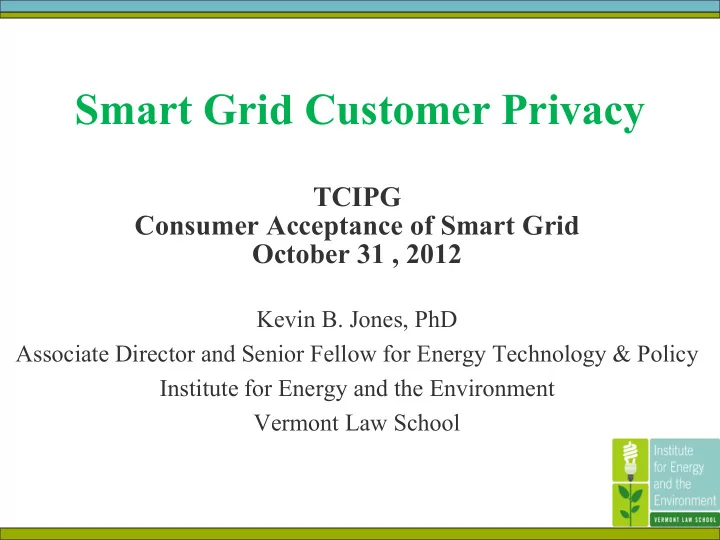

Smart Grid Customer Privacy TCIPG Consumer Acceptance of Smart Grid October 31 , 2012 Kevin B. Jones, PhD Associate Director and Senior Fellow for Energy Technology & Policy Institute for Energy and the Environment Vermont Law School
Institute for Energy and the Environmen t The IEE is a national and international resource for energy law and policy. Our research team is selected from top students in the energy and environmental programs at VLS. In 2010 we initiated our Smart Grid Project funded by US DOE Examining best practices in smart • grid implementation through 6 utility case studies Addressing the legal, regulatory, • and policy challenges of smart grid implementation, including privacy 2 concerns
What are consumer perceptions? Smart Grid Consumer Collaborative 2012 Consumer Pulse Research: About 1/2 of consumers (54%) say they have never heard of the smart grid and another 1/5 th (21%) say they they have heard the term but don’t know much about what it means Favorability 52% (+), 26% (+/-) 13% (-)
The Privacy Challenge “We . . . have the technology to record . . . energy consumption . . . every minute, second, microsecond, more or less live. From that we can infer how many people are in the house, what they do, whether they're upstairs, downstairs, do you have a dog, when do you habitually get up, when did you get up this morning, when do you have a shower: masses of private data.” Martin Pollock, Siemens Energy “Privacy Concerns Challenge Smart Grid Rollout,” Reuters (June 25, 2010).
The Rest of the Story …. “We think the regulator needs to send a strong signal to say that the data belongs to consumers and consumers alone. We believe that’s a blocker to people adopting the technology.” Martin Pollock, Siemens Energy “Privacy Concerns Challenge Smart Grid Rollout,” Reuters (June 25, 2010).
Privacy is Paramount for Public Acceptance Consumer concern about data security in other sectors • Examples from Epsilon, Facebook, Google, Nintendo, etc. State scrutiny of privacy implications • “It is the policy of the state to promote . . . smart grid functions . . . in a manner that is consistent with security and privacy. ” Maine Smart Grid Policy Act. • Colorado Smart Grid Task Force tasked to review potential impacts to “ consumer protection and privacy. ”
Privacy Principles Leading to a Model Utility Privacy Policy
Privacy Principles for Utilities 1. Make privacy the default setting. 2. Provide complete privacy protection. 3. Know the law regarding public disclosure in your state. 4. Only store/provide access to necessary information. 5. Obtain written consent before disclosing to most third parties. 6. Educate customers about the implications of sharing data with third parties. 7. Notify customers when data is disclosed. 8. Develop a plan for contingencies. 9. Make your privacy policy accessible to customers.
“Numerous companies are already developing Web and smartphone applications and services for business and consumers that can use Green Button data to help consumers choose the most economical rate plan for their use patterns; deliver customized energy-efficiency tips; provide easy- to-use tools to size and finance rooftop solar panels; and conduct virtual energy audits that can cut costs for building owners and speed the initiation for retrofits. Developing innovative applications and services to help consumers understand and manage their energy use and understand the environmental impacts of that usage is a field ripe for American innovation.” (source: www.greenbuttondata.org)
www.voltstats.net How does the site work? The site interfaces with the webservice used by Onstar's mobile applications. Currently, the service is polled 2 times a day for updated vehicle information…. What happens when I login to the site? …the site communicates with the OnStar webservice to validate your account.…The site stores your username, password, and a token received from the OnStar webservice. The password is hashed and salted with bcrypt making it virtually unrecoverable. The password is stored to allow you to login to the site to manage your account without talking to OnStar every time. When the site needs to poll your car, the token is used to authenticate with the webservice…. It'd be cool to track X, can we do that? Right now, I can only get data that you can see on your phone. We might be able to get data from other sources (onstar.com/myvolt.com) in the future.
Volt Stats Membership Groups: Michigan Capital City
Voluntary Release to Third Parties lllinois AG Position “The People do not take issue with ComEd’s commitment to ensure that customer usage data is released only when the customer authorizes it. That being said, the devil is in the details. In any order … the Commission should require that ComEd provide a report detailing information about the Green Button initiative and other instructions to ensure that ratepayers do not unwittingly authorize the access to personal information…” The Illinois Commission “The AG … raise a valid point regarding the need to adequately educate consumers regarding the authorization of access to personal information … ComEd should work with stakeholders to ensure that customers are properly informed.”
Privacy Impact Assessment Utilities must conduct a PIA with the following goals: Determine whether the utility’s information handling and use complies with legal, regulatory, and policy requirements regarding privacy; Determine the risks and effects of collecting, maintaining, and disseminating information in identifiable, or clear text, form in an electronic information system or groups of systems; and Examine and evaluate the protections and alternative processes for handling information to mitigate the identified potential privacy risks. The utilities information collection, storage, disclosure, and destruction procedures should be reviewed annually.
The Way Forward There are substantial operational and environmental benefits to achieving a smart grid: Comprehensive state and utility policies are necessary to protect consumer privacy Educating consumers on both the positive attributes and risks of third party release of data is www.vermontlaw.edu/smartgrid essential to success kbjones@vermontlaw.edu Utilities and policymakers should be more proactive on emphasizing consumer benefits.
Recommend
More recommend